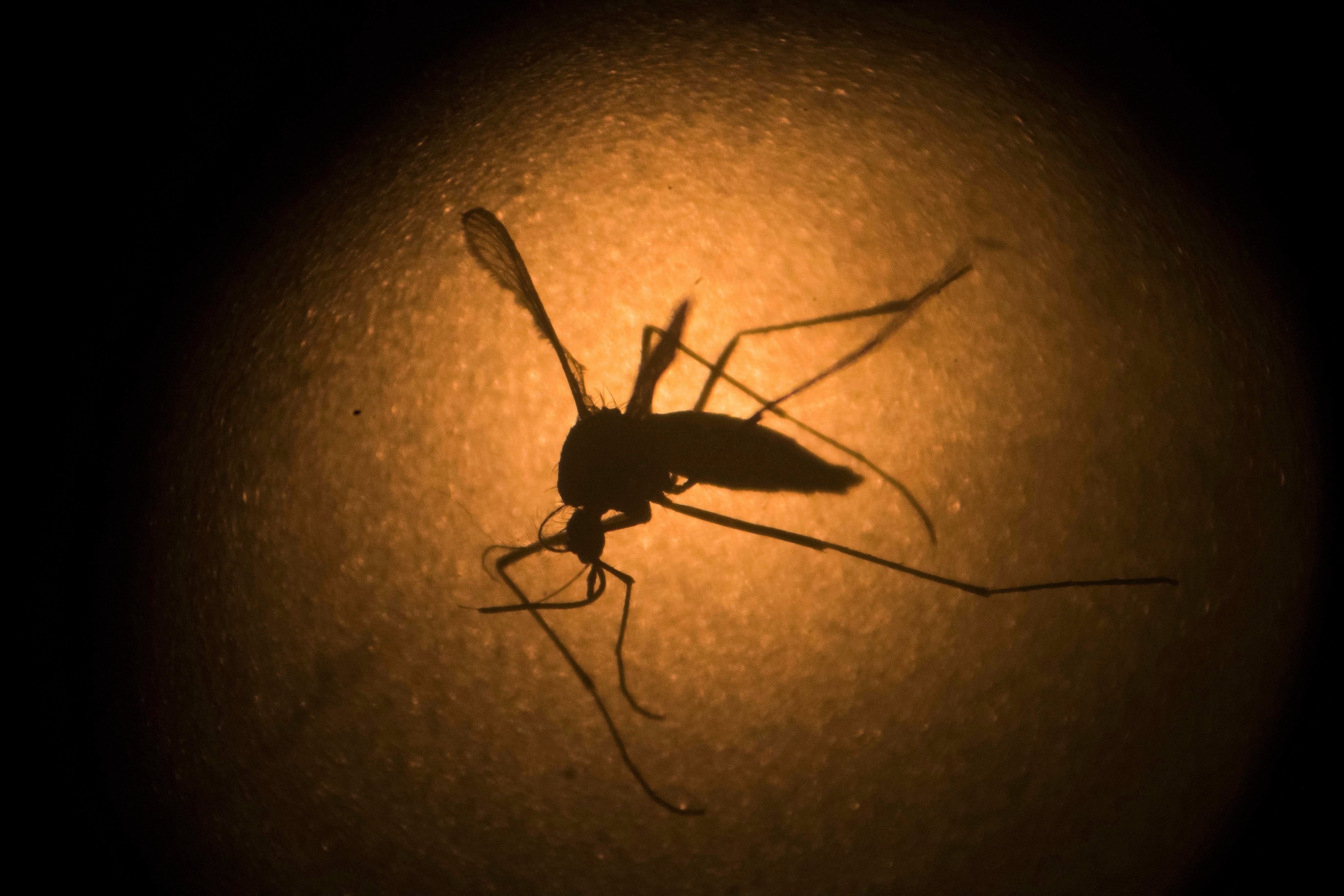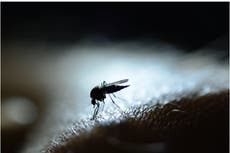The worrying rise in dengue fever and what it could mean for the UK
Invasive mosquitoes pose an increasing risk to the UK, a senior goverment scientist tells Andy Gregory


Despite the mosquitoes which carry it rarely venturing more than 100 metres over their short lifespan, more than half the world’s population is at risk of dengue fever.
Also known as “breakbone fever” due to the muscle spasm and joint pain it inflicts, just nine countries had recorded severe dengue outbreaks prior to the 1970s, according to the World Health Organisation (WHO).
But with experts having “dropped the ball” on mosquito control in that decade, according to ex-WHO chief Margaret Chan, climate change, rapid urbanisation and the increasing interconnectedness of global trade and travel in the years since are said to have created a “perfect storm” for its spread.
As a result, the prevalence of dengue fever has surged “dramatically” as the fastest-spreading mosquito-borne viral disease in the world, and is now endemic in more than 100 countries, affecting up to 96 million people each year, the WHO said in 2019.
‘A really worrying’ expansion
Following a significant drop in cases due to health restrictions during the coronavirus pandemic, the UN health agency’s dengue chief Dr Raman Velayudhan warned last month of a “really worrying” expansion of the virus’s global spread in 2022 – in which the climate crisis has “played a key role”.
Dengue is spread by two types of mosquito – aedes aegypti, originating in West Africa, and aedes albopictus, also known as the Asian tiger mosquito – which also transmits yellow fever, zika, chikungunya and other viruses. While causing flu-like symptoms, dengue can be fatal, claiming at least 1,200 lives last year.
“It worries us that the mosquito and these diseases have been increasing with climate change, by altitude and by latitude, so now we are seeing transmission where we didn’t see it before,” Dr Diana Rojas Alvarez, WHO technical lead for zika and chikungunya, warned last month.

Cases have been reported in new areas and altitudes across South America, while Thailand, Singapore and Malaysia have also warned of the potential for “massive” outbreaks this year, with infections also expected to rise in Africa.
Despite experiencing its first localised dengue outbreaks only in 2010 – in France and Croatia – Europe also saw its share of the virus following last year’s summer of record-breaking heat, with nearly 40 cases in the south of France – said to be more than the total seen in the past decade.
These outbreaks highlight “the rapidly changing epidemiology of dengue”, according to Dr Owain Donnelly, from London’s Hospital for Tropical Diseases, who presented the case of a British woman infected in Nice to scientists at a Copenhagen summit last month.
“With climate change, particularly hotter temperatures and more rainfall, and increasing global trade and tourism, we may see more parts of Europe with the right combination of factors for dengue outbreaks,” Dr Donnelly said.
Invasive mosquitoes ‘pose an increasing risk to Britain’
The insect responsible for the European outbreaks, the tiger mosquito, has also been detected by authorities in the UK on multiple occasions since 2016, in England’s southeast. No local populations have yet been established – despite their eggs being capable of surviving through European winters.
According to one 2019 study published in the Journal of the Royal Society Interface, these mosquitoes could become established across nearly all of England and Wales by the 2060s.
“For now, only some small areas in southeast England seem to be suitable but future scenarios suggest that the Asian tiger mosquito could become established over almost all of England and Wales,” lead author Sören Metelmann said at the time.
Just last month, the government handed £1.25m to scientists at the University of Glasgow, the UK Centre for Ecology & Hydrology and the UK Health Security Agency to explore how climate change could increase the risk of mosquito-borne disease in Scotland and to enhance the country’s preparedness.

Dr Steven White, of the UK Centre for Ecology & Hydrology, said that although the UK does not have breeding populations, the spread of tiger mosquitoes – now widely established across western Europe, and detected as far north as the Netherlands – “is something to be monitored”.
“Currently, there is little risk to the UK according to our modelling work, however, climate change is likely to increase the probability that these mosquitoes could survive in the UK in future, and bring with it the possibility of small dengue outbreaks,” he told The Independent.
The project’s lead, Professor Heather Ferguson, said the “extremely rare and sporadic” reports of tiger mosquitoes in the UK likely “reflect a very occasional and incidental introduction”, possibly in transport.
Even if climate change brings the hotter temperatures needed by these mosquitoes, conditions in the UK could still remain too cold in the short-medium term for the virus to replicate and spread, Prof Ferguson said.
“However there is a need for vigilance and enhanced surveillance to assess the risk” under varying climate scenarios, she said, calling dengue “particularly worrying considering its high public health impact and the in evidence of its recent expansion into more temperate regions where it causing devastating epidemics”.
Furthermore, other mosquito-borne viruses such as chikungunya and West Nile virus may require lower temperatures to spread, Prof Ferguson said, adding: “It is crucial for the UK to invest and collaborate closely with our European neighbours on robust surveillance.”
While the majority of illnesses and deaths caused by mosquito-borne diseases occur in the tropics, “there is an increasing risk posed by mosquitoes invasive to the UK”, Dr Isabel Oliver, chief scientific officer at the UK Health Security Agency, told The Independent.
“Factors behind this increasing risk include climate and environmental change, the globalisation of travel and trade as well as changes in land use. To date, no cases of dengue fever have been acquired in England; infections reported here are in individuals who have recently travelled to affected countries.
“However, in recent years we have seen small outbreaks of infection as close as France.”
In addition to monitoring infections in people, the UKHSA carries out surveillance of mosquitoes “to monitor risks to the health of the population so we can identify and changes promptly and effectively”, and has strengthened these efforts after establishing its new Centre for Climate and Health Security, Dr Oliver said.
‘Major economic and public health implications’
One recent study indicated that up to 8.4 billion people could be at risk from dengue and malaria by the end of the century if greenhouse gas emissions keep rising at current levels, in a “worst-case scenario”.

According to Felipe Colón of the Wellcome Trust, the study also warned of a “significant expansion towards higher altitudes and temperate regions where people might never have been exposed to these diseases, and health systems are unprepared for dealing with them”.
Pointing to the recent outbreak in France, Dr Colón warned in October that “this could have major economic and public health implications for countries with no previous experience in managing these diseases”.
‘Great promise’: How could the spread be halted?
According to Dr Colón, limiting fossil fuel emissions would likely see large reductions in this forecast spread of the virus.
There are other hopes for combatting dengue. Dr Velayudhan of the WHO pointed to one vaccine, licensed in some 20 countries, which is effective in people who have already had dengue once, while two other vaccines and antivirals are currently at a trial stage.
One practice also showing “great promise”, according to Dr Velayhudhan, is that of infecting mosquitoes with a common parasite called Wolbachia, which blocks viruses such as dengue and zika from replicating.
The World Mosquito Programme has now released millions of infected mosquitoes in at least 12 countries, with encouraging results. In Yogjakarta, Indonesia, dengue cases fell by 77 per cent, according to one study, while in Colombia’s Aburra valley, they fell to their lowest level in two decades, as cases were slashed by 94 per cent across Medellin, Bello and Itagui.
“This is an intervention that's been proven. It works. It's simple. And once it's done, it's done,” said Lesley Gillespie, chair of the World Mosquito Programme’s philanthropy advisory council.
But speaking to the Daily Telegraph last month, Dr Katie Anders, director of impact assessment at the WMP, said of dengue: “It’s an increasing problem in frequency, size and geography … and that’s a trajectory that will be hard to turn around at a global scale.”
Join our commenting forum
Join thought-provoking conversations, follow other Independent readers and see their replies
Comments



Bookmark popover
Removed from bookmarks